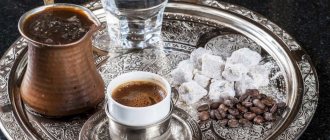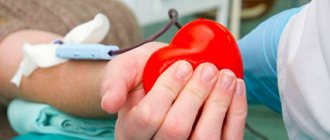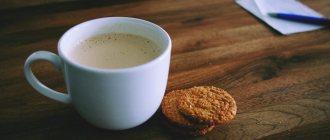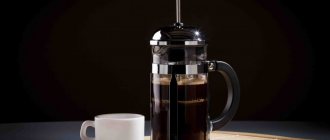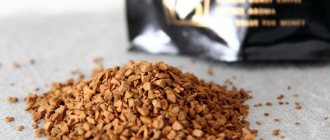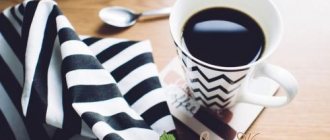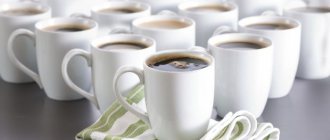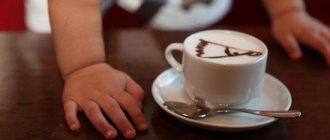Coffee lovers always start their morning with a cup of espresso. The habit has become so ingrained in the mind that one cannot live even a day without a drink. Let’s find out you can drink a flavored drink before various procedures such as ultrasound, tests, tattooing.
Medical specialists perform all tests on an empty stomach. There are restrictions on eating, drinking many drinks, and performing ultrasound diagnostics of all abdominal organs. Diagnostic doctors recommend limiting coffee consumption before an ultrasound scan. And before tattooing there are a number of contraindications, even in drinking drinks. Restrictions are often met with hostility by patients. Especially those who have been accustomed to waking up with coffee for many years in the morning.
Coffee before an ultrasound: what does it affect?
Most medical centers recommend eliminating alcohol, fatty foods, fried foods, juice, soda, sweets, dairy and legumes 2-3 days before the examination. Caffeine is also prohibited. It is difficult for coffee lovers to spend 3 days without their favorite drink, so most responsible people still break their diet by allowing themselves a small cup of coffee. But on the day of the examination you need to refuse it.
Please note that tea also contains caffeine, so it is recommended to avoid it before the examination.
Usually an ultrasound of the abdominal cavity is done in the morning, on an empty stomach. If the procedure is carried out after 15:00, you are allowed to eat some food in the morning. Coffee is usually a no-no, but if you have extremely low blood pressure, you should discuss this issue with your doctor, as some studies have shown that its effect is not that significant.
Interestingly, many people who have problems with the gastrointestinal tract constantly start their day with coffee, as it has a positive effect on their well-being:
- The smooth muscles of the bile ducts relax, the gallbladder works more actively. That is, if the gallbladder is examined, the picture after drinking coffee will be incorrect, and the problem may not be noticed.
- Caffeine stimulates the active secretion of gastric juice. Even a small cup of a weak drink can significantly increase its quantity and concentration, which again distorts the real situation.
- Caffeine constricts all blood vessels in the body, including those in the gastrointestinal tract. This makes foods in the small intestine less absorbed and take longer to digest. An ultrasound will only show that the process is progressing, but it is not clear why it is so slow - due to caffeine or certain problems.
To get 100% accurate data, it is better to give up caffeine, or discuss this issue with your doctor and ultrasound specialist.
You should not drink coffee in the hope that it will not affect anything, because it concerns your health. The examination is carried out in order to identify the real problem, and it is better to be patient in the morning and find out reliable information about your health than to hide the problem or start treatment if there is no real disease. Some medical centers refuse to do an abdominal ultrasound if the patient drank coffee or tea on the day of the examination.
Do an ultrasound on an empty stomach, and then drink your favorite drink. Most examinations are carried out in the morning, so it is not so difficult to comply with the condition of not consuming caffeine on the day of the ultrasound. The procedure is completed in just a few minutes, and you will then be able to drink caffeinated drinks. Take a thermos with you, or find a cafe nearby if you still can’t wake up and feel cheerful.
Prohibited Products
Regardless of how many days a person must adhere to a diet, the diet imposes a taboo on a certain list of foods. Doctors categorically do not recommend eating foods that irritate the intestines and cause gas formation. Perhaps such restrictions will bring a person discomfort associated with giving up his favorite food. However, the veracity of the results obtained depends on compliance or non-compliance with the diet rules. During the diet, the following are prohibited:
- Fatty dairy products, milk in any form. Milk contains lactose, which is highly undesirable to consume before the test. This is due to the fact that many people have an acute deficiency of intestinal enzymes responsible for the breakdown of lactose. Unsplit enzymes, in turn, cause fermentation and gas formation processes in the intestines.
- Fresh fruits. Despite the fact that with proper nutrition, the consumption of fruits is not only allowed, but also strongly recommended, the diet before an ultrasound puts a strict taboo on them. Any fruit contains fructose, which also causes flatulence.
- Bakery products are not recommended due to their content of complex carbohydrates called polysaccharides. They, similar to previous products, contribute to the accumulation of gases in the intestines. However, following a diet does not imply a complete exclusion of bread and bakery products. Only a slight restriction in their use is required. Preference should be given to white varieties of bread. Black should be completely abandoned during the diet.
- Legumes. Peas, beans, soybeans and lentils - all these products also contain difficult-to-digest polysaccharides that cause flatulence and irritate the intestinal mucosa.
- Vegetable crops. Everyone knows that fresh cabbage causes bloating and flatulence. Similar polysaccharide compounds are also found in potatoes, onions, asparagus, and corn.
- Fatty types of meat and fish. The effects of large amounts of fat on the intestines are similar to those of polysaccharides and complex carbohydrates.
- Drinks containing carbon dioxide. Carbon dioxide accumulates in the intestines and causes bloating. Additionally, most sodas contain sweeteners, colors, and other synthetic ingredients that can irritate your gut. Also, do not forget that if a person has symptoms indicating possible stomach problems, sweet carbonated drinks are prohibited not only when dieting.
- Various spices. They cause irritation to the mucous membrane of the stomach and intestines.
Coffee during a diet before abdominal ultrasound
If the doctor allows you to drink coffee 2-3 days before the procedure, keep in mind that it should be black and natural. You cannot add milk or cream, sugar or syrups, as all this can affect both excessive gas formation and the condition of blood vessels. If you drink 4-6 cups of coffee daily, it is recommended to reduce the amount during the diet, and drink no more than a cup or two per day if you cannot wake up and get active without coffee. This is also a recommendation for people suffering from low blood pressure. Without coffee, you may feel dizzy and weak, but this is not a reason to continue drinking coffee as usual.
Be sure to tell your doctor if you consumed foods or drinks prohibited during the diet. In some cases, the test will be delayed, in others, doctors may make allowances and consider the result based on caffeine consumption.
You can switch to decaffeinated coffee, but only natural ground coffee. Soluble decaf is prohibited; it contains many chemical additives, stabilizers, preservatives, and dyes. The share of natural coffee in soluble granules is usually 15-30%, and in decaffeinated coffee - up to 5%; everything else is additives that unnecessarily irritate the digestive tract and stimulate the active secretion of bile, and in addition, affect the condition of the liver. The decaffeinated natural drink should also be consumed in moderation, without added milk or sugar.
Regular instant coffee before an abdominal ultrasound is strictly prohibited by all doctors.
It is better to choose a drink from a coffee machine rather than one brewed in a Turk, or carefully strain the latter. The smallest grains of grounds can enter the digestive system, and due to the natural acids they contain, cause heartburn or similar symptoms, in addition, they will give an inaccurate picture on ultrasound.
Basic nutritional recommendations
As mentioned earlier, the menu of a person preparing for an ultrasound should include only those products that are allowed for consumption during this period. Allowed to consume at this time:
- low-fat cheeses;
- boiled fish;
- porridges cooked in water (rice, buckwheat, oatmeal);
- lean boiled meats (chicken, beef);
- soft-boiled chicken eggs (you are allowed to eat 1 piece per day).
A well-designed menu from the listed list of products is complete; it will provide the body with all the necessary nutrients. A person should not deviate from his usual diet, that is, he needs to eat 3-4 times a day. These types of cereals and lean meats will supply the body with the required amount of calories. Soft-boiled eggs and low-fat cheese are excellent options for afternoon snacks and snacks.
To quench thirst during the diet, various herbal (weak) teas and purified water in any quantities are recommended. However, we should not forget that unlimited fluid intake is allowed only in the first days of the diet. On the day of the procedure, some restrictions are introduced.
Conclusions:
- To obtain the most accurate results, it is recommended to give up coffee 2-3 days before an abdominal ultrasound.
- As a last resort, do not consume caffeine on the day of the test.
- If you cannot give up your favorite drink, be sure to consult your doctor: when investigating certain problems, relaxations in the diet are possible.
- If you hide the fact that you drank coffee, the ultrasound result may be unreliable.
- If coffee is allowed, try to reduce the volume and drink it weakly, choosing a natural rather than instant drink.
- The use of decaffeinated drinks should be discussed with your doctor.
Is it allowed to drink water before the ultrasound procedure?
You should not drink water immediately before the ultrasound examination. It enters the lumen of the gastrointestinal tract, passes it from beginning to end, participates in digestion and is completely absorbed only in the lower parts of the colon. This process takes an average of 1.5 hours, after which the digestive tract is free of liquid, and it does not interfere with the study.
If you do not drink water for 1.5 hours, or at least at least 1 hour, then the results of the organ examination will be the most reliable. Therefore, preparation for an ultrasound includes refusing to drink liquids 1-1.5 hours before the examination.
An exception is cases when it is necessary to examine a hollow organ - the stomach, the bladder, in which the doctor may ask the patient to drink a certain amount of water immediately before the examination. By filling the organ, water helps to better visualize its configuration and the condition of the wall. In all other cases, limiting the drinking regime is mandatory.
Immediately before the ultrasound examination of the kidneys, you need to drink 1-1.5 liters of water (unsweetened tea or compote is allowed), if the doctor will carry out the diagnostic procedure not only of the kidneys, but also of the bladder with the ureters, which is not uncommon in recent times. This is due to the fact that a fluid-filled bladder is better visualized by an ultrasound device during examination.
But before the ultrasound of the abdominal organs, it is forbidden to eat and drink - approximately 7.5-12 hours should pass between the last meal and arrival at the hospital.
How should you prepare for diagnosis?
Ultrasound examination of the kidneys and adrenal glands is usually prescribed when persistent high blood pressure cannot be reduced by conventional methods.
The following factors also include:
- lower back pain and renal colic;
- negative change in urine tests;
- inflammations and diseases of an infectious nature;
- diseases of the endocrine system;
- enuresis;
- suspicions of the presence of neoplasms;
- injuries.
The attending physician who has given the patient a referral for examination should give advice - what should not be eaten before an ultrasound of the abdominal organs and why, whether the procedure is carried out on an empty stomach or not, whether it is possible to drink water before an ultrasound and how much. You need to eat in small fractional portions, preferably take food at three-hour intervals, and you cannot drink it down.
During the day you need to drink 1.5 liters of liquid. Now let's look at the detailed recommendations. 3 days before the test, it is necessary to completely avoid eating food that increases the formation of gases in the intestines.
Prohibited products:
- baked goods – cookies, pastries, cakes, buns, pies;
- black bread;
- candies and chocolate;
- fatty fish and poultry;
- pork;
- legumes;
- sausages;
- fresh vegetables and fruits;
- sweet carbonated and alcoholic drinks;
- juices;
- smoked meats and spices;
- mushrooms;
- pickled vegetables;
- strong coffee;
- milk.
Consumption of grain porridges (barley, buckwheat, oatmeal), lean meat (beef, chicken) and fish, low-fat cheese, and boiled eggs is allowed. It is advisable to steam, bake or boil products.
The evening before the procedure, until 20.00, a light dinner is allowed; it should not include fish and meat products (even dietary ones). If the patient is prone to constipation, before 16.00 you need to take a drug that stimulates bowel movements (Senade, Senadexin) or administer a Bissacodil rectal suppository. If the patient does not tolerate laxatives well, a cleansing enema is prescribed 12 hours before the diagnostic session.
On the day of the examination, breakfast is excluded! Is it possible to eat in the morning if the procedure is scheduled for 15.00? In this case, food is allowed until 11.00, and two hours before the test the patient must take 2 capsules of Simethicone or 5 to 10 tablets (depending on weight) of activated charcoal. Eating should take place in a calm environment, without talking or rushing - this will avoid swallowing air.
